- Home
- Peter Grainger
Lane: A Case For Willows And Lane
Lane: A Case For Willows And Lane Read online
LANE
By Peter Grainger
“So I thought I might take up para-gliding. You know, buy one on eBay and just jump off the cliff one morning.”
Emily Willows is middle-aged, widowed, wealthy and bored. When she makes those flippant remarks to her son over coffee one Friday, she has no inkling that within a few hours she will be facing the most terrifying situation of her life. Nor could she have guessed that she will be confronting it with the enigmatic young woman who moved in next door a few months ago and who has hardly spoken a word to her since. And neither of them has realised yet that after this meeting, their lives will never be the same again.
With thanks to Jan, Karen, Cindy and Gary
Chapter One
Emily Willows watched her new neighbour and wondered again, not that the woman was really a new neighbour any longer. She, this woman, had bought the adjacent house last May and it was now August. During that time they had barely spoken, and what had been said was no more than the most superficial of politenesses – a few good mornings when they met each other on the path into the bustling little town which some insisted was still a village. Once, about a month ago, when fate had thrown them together in a queue at the butcher’s, Emily had made an effort to chat because it really was a little embarrassing by now, being neighbours and not speaking.
Her efforts in Mr Donovan’s shop had met with little success. ‘So,’ she had said with a smile, approaching the matter as if they were in the habit of acknowledging each other’s existence, ‘how are you finding Polcoombe?’ There had been a pause, as if the woman, whose name was Lane - that much had been established from a fortuitously mis-delivered letter - as if she suspected that it was a trick question. And then came ‘Oh, it’s absolutely charming.’
That was all – ‘charming’. As far as Emily Willows was concerned, this was akin to saying that the sea this morning is absolutely a sort of greenish blue or bluish green. A statement of the blindingly obvious. Every article and advertisement ever written that has anything to do with Polcoombe includes the word ‘charming’ – it’s beyond a cliché, she thought afterwards, it’s almost insulting to say that and nothing more.
She hadn’t given up though, in the butcher’s.
‘I imagine that it’s very different to where you’ve come from,’ with a distinctly encouraging smile.
‘Yes, very.’
The queue shuffled forward; Mr Donovan’s daughter Amy was missing that morning, probably attending an ante-natal class, expecting her second, still not married.
‘Where was that? I hope you don’t mind me asking!’ with a smile so encouraging now that it was beginning to hurt. And the extraordinary thing was that the woman did mind, it was obvious from her frown and pursed lips.
‘Of course not. I moved down from London.’
London. Home to about eight million people and covering tens of thousands of acres, Lord knows how many boroughs and postal districts and suburbs, all with names. But Ms Lane – no sign of a ring but who knows – was content to say that that’s where she had moved from. London.
There had been one more attempt to establish a line of communication.
‘Oh, what a change for you! Was it your work that brought you this way?’
Emily doubted that. There had been no suggestion of regular comings and goings, and no sign, in her occasional glimpses, of business clothes or a briefcase.
‘No. I’m retired.’
Emily knew that she had probably failed to hide her surprise at that – retired? The woman was in her thirties. She was slender to the point of being a little thin, but toned, and when she wore a T-shirt one could see muscles in the arms. How could she possibly be retired?
Emily would have said ‘Really, what did you used to do?’ but Mr Donovan interrupted with ‘Now then, Mrs Willows. It’s Friday so it must be chops!’ That’s what it means, to be part of a community, to be known, and she hoped that Ms Lane, if Ms she was, might appreciate that and treat her with a little more respect, if she couldn’t manage friendship. But when she turned around after being served that morning, she found to her surprise that her next-door neighbour had disappeared.
This being a Friday too, all that must have happened three weeks ago to the day. Since then, nothing more than a nod when Ms Lane looked in as she passed the house and saw her neighbour looking out at her; there was something quick in the woman’s movements that would have caught even the most practised of curtain-twitchers, Emily had reflected uncomfortably as she watched the figure walking down into the town once more.
Now, early on this brilliant August morning, the latest in a long succession of them, she could see the woman at her own front gate, stretching herself very thoroughly before going for a jog – though Emily fancied from what she had seen of this before that a run was a more appropriate term. A black singlet that she could get away with because of her tiny bust, dark blue track suit bottoms and professional-looking white trainers that were most certainly not from the discount store at Trago Mills. She pays a lot of attention to her legs, the hamstrings and things, but it wasn’t Emily Willows’ imagination – Ms Lane always spends more time working on her left leg than her right. And that makes sense, she thought, nodding to herself, because I have seen her limp once or twice; nothing very noticeable and not all the time but she does for a few steps now and then… And just before she runs, she springs up like that on the balls of her feet, bounces a few times, opens the gate and turns left onto the footpath that takes one up along the steep slope that forms the eastern side of the tiny harbour. Steep it might be, but she never walks that first section; the woman runs up it, leaning into the hill, hunching her shoulders and punching those muscly arms as if she enjoys the pain, or as if she has in front of her some invisible adversary.
Emily Willows looked down at her own steadily spreading middle and wondered how far she would get up the hill if she tried to run. She had been fit as a girl and enjoyed school games but even then she was more of a thrower than a runner. Ms Lane had a good twenty years on her, too, and that makes a big difference, doesn’t it? Nevertheless, she ought to do something, with her blood pressure seeming to inch up a little each time Dr Scott managed to detain her in the surgery long enough to measure it. Get one of those DVDs and do a Zumba or something. Or start going for proper long walks instead of her customary ten minutes up to the top of the rise and a sit on the seat that overlooks the beetling cliffs and the beautifully crinkled blue-green sea beyond.
Robert was coming soon, and so there was a point to the morning, which made a nice change – he was bringing a card for her birthday tomorrow because he was on duty all day then, and in the middle of a big case that had had his attention for months, it seemed. As she tidied the kitchen and prepared the coffee machine, she found her thoughts wandering back once more to her neighbour. How far does she run? Sometimes she’s gone for an hour or more. Fit people can probably run at eight or ten miles an hour if a steady walking pace is three – does she really run that far back towards Plymouth? No wonder there isn’t an ounce of fat on her.
And then Emily Willows had one of those moments that her husband Ron, when he was alive, used to marvel at – he’d say think yourself lucky you weren’t born three hundred years ago because they’d have drowned you as a witch; she thought to herself, I wonder what she’s running away from…
When the whole of the house had been tidied and all of the downstairs had been hoovered, there was still no sign of her son, and so she went out into the garden. These houses were built in the days when land was cheaper, even in the steep and hidden coves of Cornwall, and her garden was a generous one, and private, too – it was overlooked only at the far
end by the upstairs of Ms Lane’s property, which was further up the hill. Their gardens were separated first by a high, traditional wall of local stone and then by a substantial wooden fence now much overgrown with climbing roses, clematis and jasmine. But where the stone met the wood there had once been a gate; to be more precise, there still was a gate but it had not been opened in many a year. Previously, Ling Cottage had belonged to a stand-offish couple who had used it only a few weeks each summer – a glorified holiday home – and Emily had never got to know them either. Any opening of the gate, for the bolt was on her own side, would certainly have been viewed as an intrusion. She stood by it now and realised that even if the rusted bolt gave way, a particularly vigorous rambling red rose had effectively sealed up the entrance and any prospect of warmer relations with her neighbour.
She crossed the lawn that sloped up towards the end of her garden and looked back at the roof and upper windows of next door, still annoyed that she had not bought it in May when she had the chance. It would have suited her, being a little smaller with just two bedrooms, and the views of the bay were better. She had mentioned it to Robert but he had said ‘It’s a dear old business, mum, thousands of pounds just to move next door? And you’d have to sell your own place first. Better off where you are.’
She had not exactly done what he had told her to do, but his words had produced enough hesitation to allow the place to slip away – a sold sign went up within a matter of days. And she would not have needed to sell her own place – nowhere near it. She could have bought next door outright, moved in and kept this place as a rental property, producing a much better return than she was currently getting at the bank, even on the five-year bonds. Robert had no idea how much money his father had left her – she was saving that for a surprise, though she was unlikely to see the look of astonishment on his face when the solicitor told him. Better see the financial advisor, too, and review the inheritance tax situation after the budget… Ronald Willows had risen near to the top of the banking profession and had taken the share options at every opportunity; she smiled at the memory of him, and at the thought of the carefully organised files and folders in his study that detailed the fine estate he had left to her. Yes, if Ron had still been here, she would have persuaded him easily enough and be living in the house that looked down a little on her own.
She had even, she recalled a little guiltily, then gone into the town and visited the estate agents, Andrewartha and Spargo, to enquire whether it was too late to put in an offer; she knew Tom Spargo’s wife from the WI and so it didn’t seem too impudent a thing to do, in the circumstances. But no, she had been told – a cash buyer, all done and dusted. Ling Cottage had been on the market for a shade under four hundred thousand pounds, and Ms Lane, retired in her thirties, had paid cash. It all added to the mystery, of course.
A car drew up somewhere in the road she could not see, while she was telling herself off for being so ungrateful – she had a home that would be the envy of millions. It might be Robert, so she walked back down the lawn and in through the patio doors. He was already inside, hanging up his jacket in the hallway, something his father always did, and then taking an envelope out of one of the pockets.
‘Happy birthday, Mum. I’m sorry about tomorrow, but when you come over for tea, we’ll have a proper do. Marie’s already baking away!’
He gave her the card and watched while she opened it – many happy returns, lots of love from the both of them. It would be nice to see a little squiggle or two at the end but Marie, who was French, was yet another one of these career girls, presently in charge of marketing Cornwall to tourists around the world. Judging by the queues of traffic coming into the town every day, she was doing a wonderful job. No chance of a grandchild in this country for a few more years, by the look of it.
Robert walked through to the lounge to turn on the television, apologising as he went but the court case was due to begin on Monday and there was talk at the station that it might make the local television news; if they got the result they deserved, he said, it would make the nationals as well. It could be the highest profile people-smuggling case ever.
The coffee machine began to hiss and bubble but she could hear Robert’s voice saying something like, so, mum, how are you doing, everything OK, as he fiddled with the tuning – the signals in Cornish coves are as famously temperamental as the weather.
Emily called back, ‘Yes dear, I’m fine. Just bored to death, as usual!’
She heard a vague, ‘That’s good then,’ followed by a burst of television noise.
‘So I thought I might take up para-gliding. You know, buy one on eBay and just jump off the cliff one morning.’
‘Good idea, mum…’
He was still tuning it in and taking not the slightest notice of her. Promotion to detective sergeant had come very quickly and now he obviously had an important role in this case – her irritation at being ignored fought a brief battle with her pride in his ambition and success, and lost.
Robert Willows appeared in the doorway with a puzzled frown and said, ‘What did you just say, mum?’
‘Never mind, my love. Here, take your coffee through, and there’s a plate of home-made biscuits as well. Eat some. I don’t suppose you’ll get a proper lunch…’
There was nothing on the news but he told her a little about the case – no details obviously, but this was a potentially significant investigation. Private airfields and isolated coves had been used to smuggle people into the country over the past two years. Nothing new there, Robert Willows said, it’s a near epidemic, but this particular lot were offering something different – business class illegal entry to small numbers of wealthy, influential people and their families, with all the necessary paperwork provided as a part of an individually-tailored service. And that’s where it gets interesting, he said – some of the documentation being provided is genuine. Somewhere along the line, these people have connections into the higher echelons of government bureaucracy.
Emily Willows had looked suitably impressed and concerned.
‘Well, that’s serious, isn’t it? It could get political.’
Robert seemed to relish the idea.
‘Oh yes, it will! Detective Superintendent Harley has made that clear from the beginning. But if anyone can pull it off, he can. He’s an organisational genius. Earlier this week he…’
And as he told her more about the case, she thought that he probably should not but it was nice that he wanted to, because so often as a mother you become a sort of afterthought, an item near the bottom of a to-do list. They fly away, and it’s not so bad if your partner is still there; it can even be liberating to have time together again, with money to spend on yourselves for a change, but then Ron had died suddenly, just at that moment when it was happening for them. He had died and now she really was bored enough sometimes to feel like jumping off a cliff.
Robert stayed for almost an hour in the end, and he didn’t do all of the talking. She told him about her neighbour, aware of how trivial her concerns seemed compared to his, but he pretended an interest and said laughingly that if she had any real worries he could always make a few inquiries about the mysterious Ms Lane. His guess, though, was that if she had come from London and had the money to buy Ling Cottage, and if she was indeed retired, then she was probably in the same business as dad – something in banking or hedge funds or investments. The new generation of money superstars could make enough in bonuses in five years not to need to work for the rest of their lives.
‘Wouldn’t that be dull though, mum? Sitting around all day with plenty of dosh in the bank but nothing to do? It could drive you round the bend!’
‘Yes,’ she said, as she got up to fetch him another cup of coffee, ‘I expect it could.’
Chapter Two
At three o’clock on the same afternoon, Emily Willows went out into the garden again. The sky was momentarily overcast now and the air was very warm and humid; Ron would have complained about it and said th
at though it was hotter in Greece, that was more pleasant, a drier sort of heat… He always said that, every year. She smiled at him and got on with the task that she had set herself, which was to dead-head all the roses that he had planted in the three years they had spent here together. Coming to Polcoombe had been the beginning of his winding down to a proper retirement after the pressures of corporate life; not before time, she had said, because Ron was seven years her senior, but as it turned out the move had not been made in time enough.
She pushed the wheelbarrow along to the next border. Her next-door neighbour was back; she hadn’t seen her return but she must have done so because there was some noise from the house and then it became a little louder, as if the woman had opened her patio doors. It was the sound of music, music that Emily Willows recognised because she had heard her younger sister play it many times – the opening to Rachmaninov’s second piano concerto. Jane had almost taken the professional route after passing every examination going, and then one morning her sister announced that she was going to have a life instead. She married a dentist, had four children and lived one of quiet contentment in Ruislip.
Emily stood for a moment, secateurs in one gloved hand and fading roses in the other, and wondered why she was surprised by her neighbour’s taste in music; then she told herself off quite sharply this time because it really was none of her business, and because she really didn’t want to be thought of as the nosy old woman next door.
At four o’clock precisely, as she did every day when she was at home, Emily Willows went back inside and switched on the kettle that had been filled ready after lunch. Leaf tea, two spoonfuls, into the Whittards ceramic teapot, and one of the bone china cups with matching saucer. Brew for three minutes, three or four stirs and pour through the strainer. Put three Rich Tea biscuits on a tiny plate from the same tea service, and take a seat at the small walnut table by the patio doors so that she could admire the garden and enjoy the slight breeze as the sun began to decline from its zenith and the shadows from the old stone wall began to inch across the lawn.

 Persons of Interest
Persons of Interest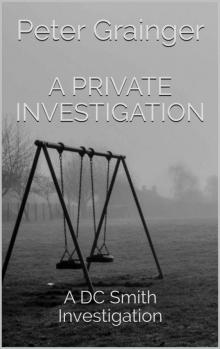 A Private Investigation
A Private Investigation Songbird
Songbird On Eden Street
On Eden Street An Accidental Death
An Accidental Death Time and Tide
Time and Tide An Accidental Death: A DC Smith Investigation
An Accidental Death: A DC Smith Investigation In This Bright Future
In This Bright Future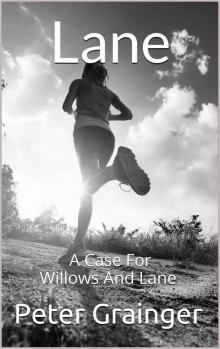 Lane: A Case For Willows And Lane
Lane: A Case For Willows And Lane The Rags of Time: A DC Smith Investigation
The Rags of Time: A DC Smith Investigation Luck and Judgement
Luck and Judgement Persons of Interest: A DC Smith Investigation
Persons of Interest: A DC Smith Investigation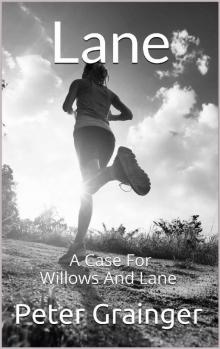 Lane
Lane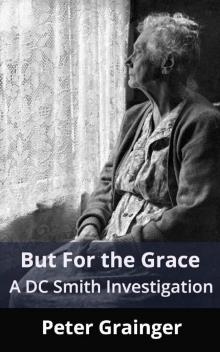 But For The Grace
But For The Grace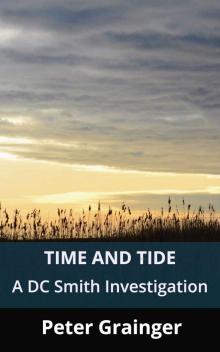 Time and Tide: A DC Smith Investigation
Time and Tide: A DC Smith Investigation In This Bright Future: A DC Smith Investigation
In This Bright Future: A DC Smith Investigation The Rags of Time
The Rags of Time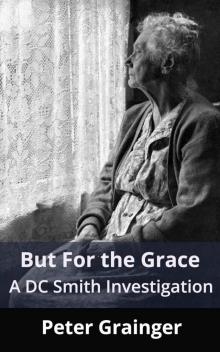 But For The Grace: A DC Smith Investigation
But For The Grace: A DC Smith Investigation Luck and Judgement: A DC Smith Investigation
Luck and Judgement: A DC Smith Investigation